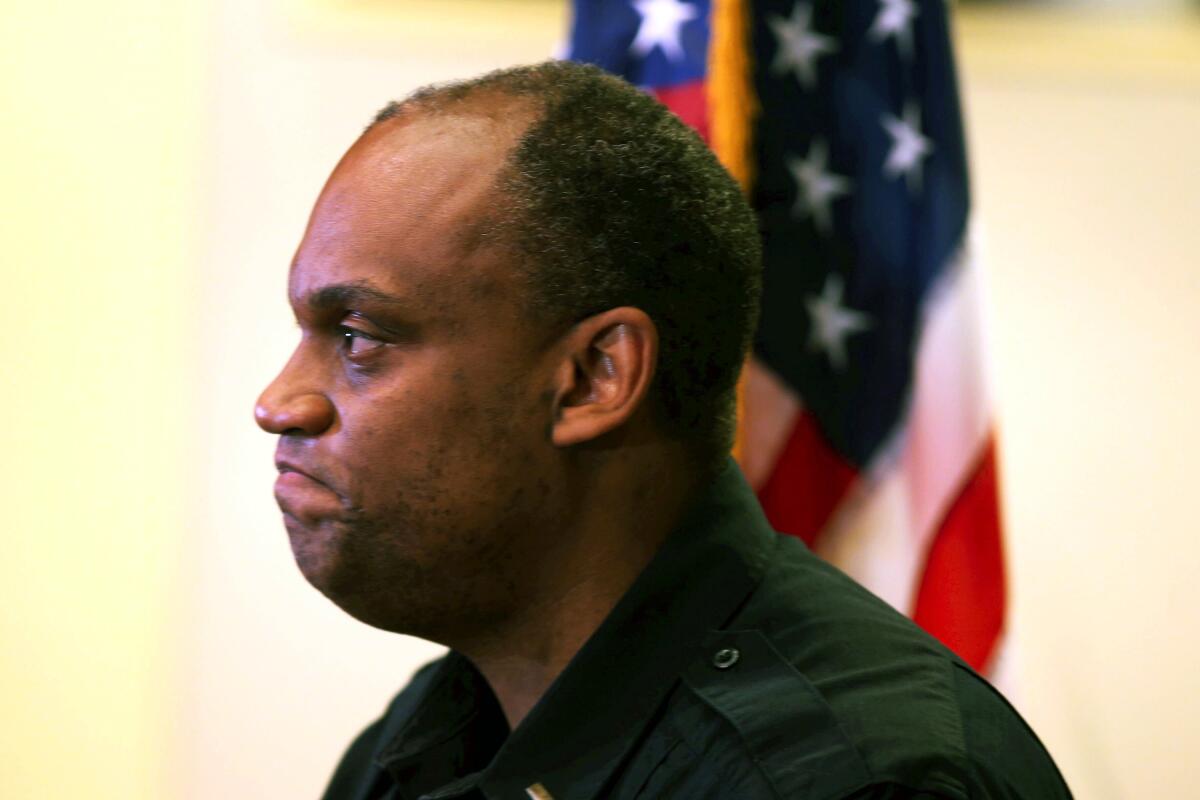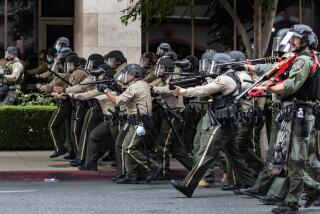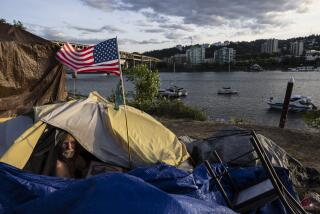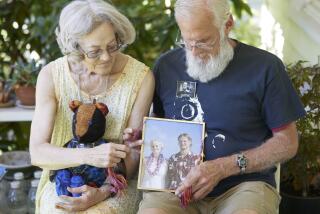As protesters call for defunding police, Northwest cities seek to reimagine law enforcement

- Share via
SEATTLE — Across the nation, political leaders are struggling to strike a balance between righting injustices in ways that might mollify those protesting racism and brutality while at the same time maintaining public safety.
Some of the more original experiments in reimagining policing are unfolding in the Pacific Northwest, home to three of the most liberal cities in America.
For the record:
4:37 p.m. June 12, 2020An earlier version of this article said non-police teams in Eugene, Ore., handled 18% of 24,000 calls to 911 last year. The teams handled 18% of 133,000 calls to 911, or 24,000 calls, last year.
In Seattle, authorities boarded up and vacated a police precinct Monday where officers in riot gear had used tear gas and pepper spray on protesters who threw rocks, bottles and incendiary devices. They have also given free rein outside to demonstrators who have declared several blocks an “autonomous zone.” That provoked angry tweets and threats of intervention from President Trump and a strong counter-response from the mayor.
In Portland, Ore., the police chief — a white woman — resigned after just six months on the job to allow a Black man to take over. City Council members also appear ready to expand a pilot project based on a program in Eugene, Ore., in which civilians are dispatched instead of police on calls that don’t require an armed response.
Yet even with growing public support for change and allies in powerful positions, activists encounter limits.
The new Portland chief, Chuck Lovell, an 18-year veteran of the force sworn in Thursday, opposes calls to cut the Police Department’s budget. Crime, he said, doesn’t cease during a pandemic or mass protests.
Jo Ann Hardesty, the first Black woman elected to the Portland City Council, has called for a “revolution,” but she defines it as cutting the size of the force rather than eliminating it. She also seeks to trim the size of a SWAT team and reassign police from school and transit duty to other beats.
She said that officers should have one role — solving and preventing crime — and not be cast as experts on mental health, housing and social services. “There’s a better alternative to sending people with weapons to address people with mental health issues and people who are sleeping in doorways,” she said.
The Portland pilot project that Hardesty and Portland Mayor Ted Wheeler want to expand is based on a model that’s attracting sudden national attention to Eugene, 100 miles south. In this smaller state-university town, 911 operators who determine that no armed intervention is needed dispatch two-person teams of medics and mental health counselors.
The teams in Eugene handled 18% of the 133,000 calls to 911 last year, requesting police backup only 150 times, said Chris Hecht, executive coordinator of White Bird Clinic, which runs the operation called Cahoots. The program, short for Crisis Assistance Helping Out on the Streets, operated on a $2-million budget last year that he said saved the Eugene-Springfield, Ore., area about $14 million in costs of ambulance transport and emergency room care.
Hecht said that the teams, in place for three decades, can arrive at the scene of a homeless person experiencing a physical or mental health crisis, defuse the situation and prevent harm in ways that police officers are neither trained nor equipped to do.
“The folks we’re working with often have a history of really unfortunate interactions with police, hospitals or other institutions,” Hecht said. “When a couple of people step out of one of our vans wearing jeans and hoodies, just right there we have a leg up on our colleagues in public safety.”
Crucial to the program, which extends to the neighboring city of Springfield, is a network including a sobering center and medical clinics where teams can refer people they encounter, he said. White Bird Clinic has been flooded with calls during the last two weeks from cities across the nation seeking alternatives, he said.
San Francisco officers will stop responding to disputes between neighbors, reports about homeless people and school discipline interventions.
In Portland, the City Council put off a vote Thursday on a proposed $245-million annual police budget after hearing hours of emotional testimony from citizens, many of whom called for $50 million in cuts. Wheeler had proposed $7 million in cuts, and Hardesty wanted to cut $16 million and lay off 52 officers.
Wheeler says he will dismantle a team of about 30 officers who investigate shootings. Hardesty and other critics accuse the Gun Violence Reduction Team of targeting people of color.
Portland’s police union opposes breaking up the team and diverting funds.
“We all see what’s going on in the country” in reaction to the police killing of George Floyd in Minneapolis, said Daryl Turner, Portland Police Assn. president, in an interview Thursday. “Portland officers do not condone or practice race-based policing.”
Turner, a Portland officer for 29 years, granted that teams such as those in Eugene could free police to concentrate on incidents requiring enforcement. But he said the union had asked the city for years to provide officers with body cams to increase accountability.
Chief Lovell succeeds Jami Resch, who will remain with the Police Department. Lovell said he wants to return to community policing, an approach pioneered by Portland in the 1980s when officers on patrol sought to build close ties in neighborhoods.
Lovell said he was not about to withdraw defenses keeping protesters away from a downtown police building that contains a jail. “The situation in Seattle is one we definitely don’t want to see here in Portland,” he said.
On Sunday, Seattle Mayor Jenny Durkan apologized for police conduct that reminded many longtime residents of a crackdown in 1999 on demonstrators protesting corporate globalization. During the “Battle of Seattle,” officers wielded batons and fired tear gas as about 50,000 protesters shut down a World Trade Organization conference.
“I know that safety was shattered for many by images, sounds and gas more fitting of a war zone,” she said during a news conference Sunday. “I am sorry.”
The next day, Durkan closed the East Precinct in Seattle’s Capitol Hill district, where gentrification in recent years has displaced many Black residents. She had tried to get police to tone down confrontations at barricades in front of the precinct, but she said they were too quick to advance with pepper spray on the crowd.
Police Chief Carmen Best, a Black woman, told officers in a video Thursday that she disagreed with the decision to vacate the East Precinct, noting that officers had been pelted with projectiles while executing her orders to defend it. “Then to have a change of course nearly two weeks in, it seems like an insult to you and our community,” she said.
Three of Seattle’s nine City Council members want Durkan to consider resigning. Protesters’ demands include cutting the Police Department budget, funding community health programs and dropping all charges against demonstrators.
Durkan has made some concessions, suspending use of tear gas, canceling a curfew and ordering police honoring fallen officers elsewhere to remove black mourning bands from their badges that obscured identification numbers. She is suspending planned purchases of weapons, technology vehicles and buildings.
The mayor is seeking to divert $100 million in the city budget to programs for Black youths and adults, as well as alternatives to arrest and incarceration.
Trump tweeted Wednesday that “Domestic Terrorists have taken over Seattle, run by Radical Left Democrats.” And Thursday, he called on Durkan and Washington Gov. Jay Inslee, both Democrats, to “take back” the city from “ugly Anarchists,” adding that if they didn’t, he would.
Durkan responded that Trump didn’t understand what was happening in the five-square-block area of the city, describing the zone as a peaceful expression of the community’s grief and desire to build a better world. “We do not need anyone, including the president, to try to sow further divide, further distrust and misinformation,” she said in a news conference Thursday.
On Friday, a federal judge in Seattle constrained Durkan’s administration further, issuing a temporary restraining order forbidding police from firing tear gas, pepper spray, flash-bang grenades, rubber bullets or other projectiles indiscriminately into a crowd.
U.S. District Judge Richard A. Jones issued the 14-day ban in response to a lawsuit filed against the city by Black Lives Matter Seattle-King County, which contended that aggressive police tactics had violated protesters’ 1st and 4th Amendment rights.
“The protesters have made it clear that their determination will be relentless until change and police reform is made,” wrote Jones, who was appointed by President George W. Bush in 2007.
More to Read
Sign up for Essential California
The most important California stories and recommendations in your inbox every morning.
You may occasionally receive promotional content from the Los Angeles Times.












